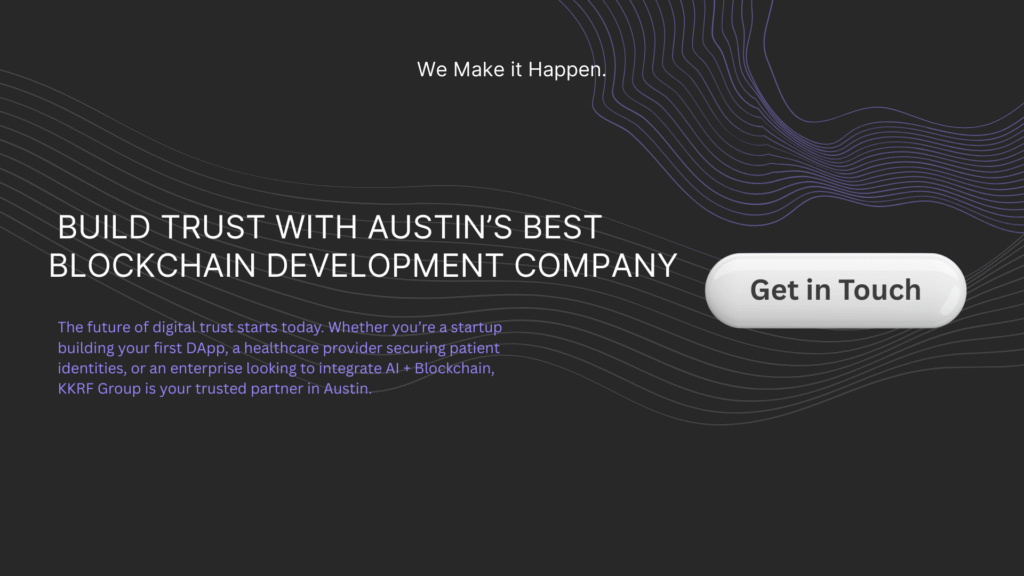Why Austin Businesses Trust KKRF Group: AI + Blockchain for Identity and Content Trust
The internet was made to bring people together, but it also caused a crisis of trust. Digital interactions are becoming less safe, with things like identity theft, data breaches, deepfake videos, and fake news. People, businesses, and even governments are all asking the same thing: How can we trust what we see, read, or do online?
The two powerful technologies are Artificial Intelligence (AI) and Blockchain. AI is great at finding patterns, abnormalities, and fraud. Blockchain, on the other hand, makes sure that data and content can’t be changed, can be verified, and is stored in a decentralized way. They work together to establish a digital economy based on trust.
Austin, Texas, is one of the best spots in the U.S. to lead this movement. Austin is a hub for entrepreneurs, businesses, and investors working on Web3, AI, and cybersecurity solutions. It’s also known as “Silicon Hills.” KKRF Group is the top blockchain development firm in Austin and a premier Blockchain development company in Austin. They make enterprise-grade DApps, NFT platforms, decentralized identity systems, and AI-powered trust solutions.
This blog talks about how AI and blockchain are changing Austin’s digital future, the industry trends that are driving adoption, the technological stacks that make these solutions work, and how KKRF Group helps businesses make their ideas a reality.
The Problem with Digital Trust
Let’s look at the problem from a different angle:
- Identity Theft: Javelin Strategy says that losses from identity theft in the U.S. reached more than $43 billion in 2023.
- Fake material: Europol says that by 2026, 90% of online material could be made up, making it hard to tell what’s real and what’s not.
- Creator Exploitation: Every year, musicians, filmmakers, and artists lose billions of dollars because of piracy, unauthorized use, and unclear royalties.
It’s clear that the digital economy doesn’t work when it comes to trust.
This is why AI and Blockchain need to work together. It’s not an option anymore.
Market Trends: Trust in AI and Blockchain for Identity and Content
There is no denying the worldwide momentum behind AI and Blockchain. Let’s look at the numbers and information from different parts of the world and split it down:
1. Managing Identities on the Blockchain
- Market will be worth $1.57 billion in 2025 and $118.96 billion by 2032.
- CAGR: 85.5%, making it one of the fastest-growing blockchain segments.
- Adoption: North America leads because of demand in fintech and healthcare. Austin’s colleges and entrepreneurs are pioneering decentralized student identity wallets and verifiable credentials.
2. NFTs for Trustworthy Content
- Global NFT market projected to grow from $61 billion in 2025 to $247 billion in 2029.
- Austin use cases: musicians tokenize albums, filmmakers mint proof-of-origin reels, and digital artists secure their work with NFT certificates.
- AI’s role: Detects copied or AI-generated content before it becomes an NFT.
3. DApps and Web3 Sites
- By 2025, there will be 24+ million daily active wallets using DApps.
- The global DApp market is expected to reach $368 billion by 2030.
- Austin use cases: Fintech DApps for transparent lending, gaming DApps with tokenized assets, and healthcare DApps for secure patient data.
4. The Convergence of Cybersecurity, AI, and Blockchain
- The cybersecurity + AI + blockchain market will reach $133 billion by 2030.
- In Austin, highly regulated industries like finance, healthcare, and EV manufacturing demand immutable yet intelligent protection systems.
Key Insight: In Austin, AI and Blockchain are not seen as futuristic trends—they are considered essential technologies for the next decade.
How AI and Blockchain Work Together
Think of blockchain as the memory and AI as the brain.
- AI (Brain): Learns, detects, and predicts fraud, fake content, or suspicious activity.
- Blockchain (Memory): Secures the truth, ensuring authenticity is tamper-proof.
This combination powers:
- Decentralized Identity (DID): Users control their own digital IDs without central authority misuse.
- AI-powered Smart Contracts: Self-executing agreements that also detect fraud.
- Authenticity Certificates: Blockchain ensures originality, AI validates it.
- Fraud Monitoring: AI flags unusual activity, blockchain stores audit-ready logs.
Breakdown of the Technical Stack
KKRF Group uses a multi-layered tech stack to build AI and blockchain solutions in Austin.
Blockchain Layer
- Ethereum: Smart contracts, DeFi, and NFT marketplaces.
- Solana: High-speed, low-cost DApps, ideal for Austin’s gaming industry.
- Hyperledger Fabric: Enterprise private blockchain, suited for healthcare and EV manufacturing.
- Polkadot: Cross-chain interoperability for startups.
- IPFS: Decentralized file storage to preserve content origins.
AI and ML Layer
- Deep Learning (Transformers, CNNs, RNNs): Fraud detection and anomaly tracking.
- Generative Models (GANs, LLMs): Detect deepfakes and assess originality.
- Graph Neural Networks (GNNs): Identity verification and fraud probability scoring.
- Federated Learning: Privacy-preserving AI training without centralized data risks.
Integration & Frontend Layer
- Web3.js, Ethers.js: Blockchain integration into DApps.
- Node.js, React: Scalable, user-friendly frontends.
- REST & gRPC APIs: Seamless AI-blockchain communication.
What Makes KKRF Different?
KKRF doesn’t just write code; it designs custom tech stacks tailored for business scalability, compliance, and growth.
Applications for Austin Businesses
Austin isn’t just adopting AI and Blockchain—it’s leading the way.
Banking and Fintech
- Transparent lending via DApps.
- DID wallets for KYC/AML compliance.
- AI-driven fraud detection.
Healthcare
- Blockchain DIDs for patient identity.
- AI monitoring for abnormal data access.
- Secure inter-hospital record sharing.
Creative Arts (Music, Film, Gaming)
- NFT-based concert tickets.
- Blockchain royalties for musicians.
- AI + NFTs to protect Austin’s indie film industry.
Electric Vehicles (EVs)
- Blockchain-enabled energy transactions.
- AI-driven battery performance forecasting.
- Decentralized EV charging networks.
Education & Research
- Blockchain-based degree verification.
- AI plagiarism and innovation detection.
- NFT-powered research publishing.
Cost Breakdown for Austin Companies
- Pilot Projects (Startups): $50,000 – $150,000 (NFT marketplaces, basic DApps).
- SMB Deployments: $200,000 – $500,000 (blockchain identity systems, healthcare DIDs).
- Enterprise Solutions: $1M+ (multi-chain AI + blockchain ecosystems).
KKRF Group offers consulting, MVP builds, scaling roadmaps, and enterprise rollouts, making it the best blockchain development company in Austin.

Why KKRF Group?
- Certified cybersecurity company (rare in blockchain).
- Mastery of 70+ tech stacks, including AI, IoT, AR/VR, and EV software.
- Industry expertise across fintech, healthcare, gaming, EV, and enterprise SaaS.
- Strong Austin presence with global scalability.
- Mission: To make Austin the global hub for AI + Blockchain trust solutions.
FAQs
Q1. What does AI do to improve blockchain identity management?
AI strengthens DID by detecting fraud attempts, analyzing biometric data, and spotting unusual access behavior.
Q2. Why is Austin ideal for blockchain development?
Austin combines tech talent, universities, startup culture, and investor backing, making it perfect for AI + Blockchain adoption.
Q3. How do NFTs build content trust?
They serve as verifiable proof-of-origin certificates, preventing unauthorized use and content theft.
Q4. Which blockchain systems does KKRF Group work with?
Ethereum, Solana, Hyperledger, Polkadot, IPFS, and more.
Q5. Which industries benefit the most in Austin?
Fintech, healthcare, EVs, creative arts, gaming, and education.
Q6. How much does it usually cost?
From $50,000 for MVPs to over $1M for enterprise ecosystems.
